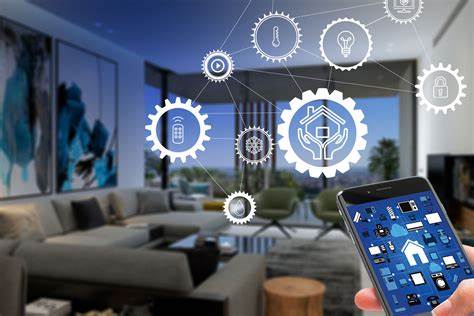In the era of smart technology, our homes are becoming increasingly intelligent and interconnected, transforming the way we live and interact with our surroundings. From automated lighting systems to voice-controlled assistants, smart home technology is revolutionizing the concept of home automation. Let’s explore how these innovations are making our homes smarter and more convenient:
- Connected Devices: Smart home technology encompasses a wide range of connected devices that communicate with each other and can be controlled remotely. These devices include smart thermostats, door locks, security cameras, and appliances, all of which can be monitored and managed through a central hub or smartphone app.
- Voice Control: Voice-controlled assistants like Amazon Alexa, Google Assistant, and Apple Siri have become ubiquitous in smart homes, allowing users to control various devices and access information using simple voice commands. Whether it’s adjusting the thermostat, playing music, or adding items to a shopping list, voice control adds a new level of convenience and accessibility to everyday tasks.
- Energy Efficiency: Smart home technology enables greater energy efficiency by optimizing the use of resources and reducing wastage. Smart thermostats, for example, can learn users’ preferences and adjust heating and cooling settings accordingly, resulting in energy savings and lower utility bills. Similarly, smart lighting systems can automatically adjust brightness levels based on natural light conditions and occupancy, further reducing energy consumption.
- Home Security: One of the primary benefits of smart home technology is enhanced home security. Smart security cameras, motion sensors, and doorbell cameras provide real-time monitoring and alerts, allowing homeowners to keep tabs on their property from anywhere. Integrated security systems can also automatically notify authorities in the event of unauthorized access or emergencies, providing peace of mind and deterrence against potential threats.
- Convenience and Automation: Automation is at the heart of smart home technology, simplifying routine tasks and streamlining daily life. For example, smart scheduling features allow users to automate lighting, heating, and other household appliances based on their preferences and routines. This not only saves time but also adds convenience and comfort to the home environment.
- Remote Monitoring and Control: With smart home technology, homeowners can monitor and control their homes remotely via smartphone apps or web interfaces. Whether they’re at work, on vacation, or simply away from home, they can check security camera feeds, adjust thermostat settings, or receive notifications about potential issues such as water leaks or smoke alarms, enabling proactive management and peace of mind.
- Customization and Personalization: Smart home technology offers a high degree of customization and personalization, allowing users to tailor their home environment to suit their individual needs and preferences. From setting up personalized lighting scenes to creating custom voice commands, users can create a home experience that reflects their unique lifestyle and tastes.
In conclusion, smart home technology is revolutionizing the way we live, making our homes more intelligent, efficient, and secure. As technology continues to evolve, we can expect even more innovations that will further enhance the convenience, comfort, and connectivity of our living spaces. With smart homes, the future of living is truly at our fingertips.

